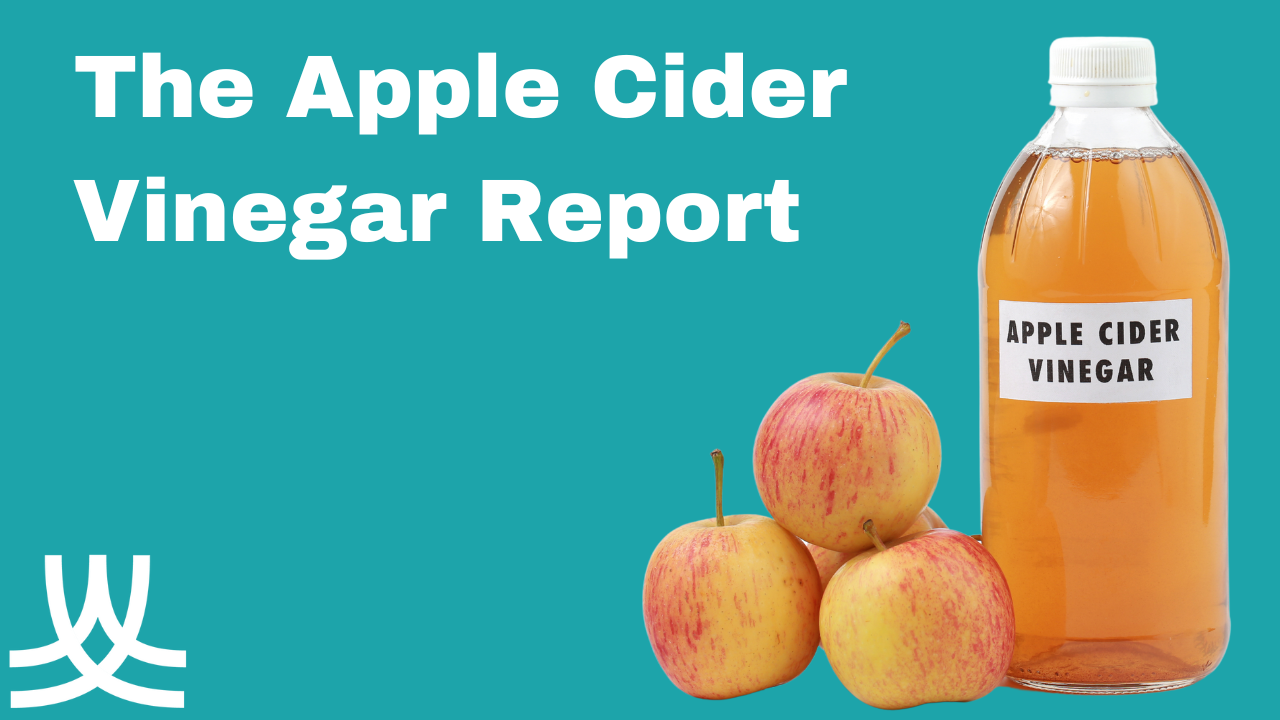Is Apple Cider Vinegar the Health Secret You’ve Been Missing? A Journey Through Time, Science, and the Search for Wellness
In the sprawling tapestry of human health, certain threads reappear with persistent intrigue. Remedies once whispered among elders, then dismissed by modern medicine, often find themselves resurrected, dusted off, and subjected to the rigorous scrutiny of science. Apple Cider Vinegar (ACV) is one such thread, a humble, pungent liquid that has traversed millennia, from ancient poultices to modern wellness shots, accumulating an almost mythic reputation. Is it, as many evangelists claim, the missing health secret, a simple yet profound elixir capable of unlocking a cascade of benefits? Or is it merely another fleeting trend, amplified by the echo chamber of online testimonials? For the discerning mind, the answer lies not in blind faith, but in a deeper dive into its rich history, its fascinating chemistry, and the evolving landscape of scientific inquiry.
This is not just an exploration of a product; it’s a story – the story of a fermented apple, transformed by microscopic life, that has captivated humanity for thousands of years. It’s a narrative woven with threads of folklore, empirical observation, scientific discovery, and the enduring human quest for vitality. Join us as we peel back the layers of myth and marvel, seeking to understand if this ancient, unassuming concoction truly holds a secret that could enhance your well-being.
The Ancient Elixir: A Whisper from the Past
Our story begins not in a gleaming laboratory, but in the sun-drenched orchards of antiquity, long before the advent of pharmaceutical compounds or even the understanding of microbiology. The earliest records of vinegar, a term derived from the French "vin aigre" meaning "sour wine," date back to 5000 BCE in Babylonia, where it was already recognized for its preservative and medicinal qualities. Fast forward to ancient Egypt, where pharaohs reputedly used it, and to the Roman Empire, where soldiers famously drank "posca," a mixture of vinegar and water, for strength and to prevent disease.
But it was in ancient Greece, around 400 BCE, that apple cider vinegar truly began its journey toward legendary status. Hippocrates, often hailed as the "Father of Medicine," prescribed it extensively. He mixed ACV with honey to treat coughs and colds, applied it to wounds for its antiseptic properties, and recommended it for various digestive ailments. His philosophy – "Let food be thy medicine and medicine be thy food" – resonates deeply with the natural, food-based approach ACV embodies. For Hippocrates, ACV wasn’t a secret; it was a foundational element of health.
Across the globe, other cultures independently recognized vinegar’s power. In China, it was used to purify hands and to fight infections. In medieval Europe, it became a common household remedy, valued for its ability to ward off pestilence and clean wounds. The "Four Thieves Vinegar," a concoction steeped in legend from the time of the Black Death, purportedly protected those who handled the deceased – whether true or not, it speaks to the pervasive belief in vinegar’s protective qualities.
This historical lineage is crucial. It tells us that ACV’s perceived benefits are not a modern invention or a fleeting fad, but rather an echo of long-held traditional wisdom. For centuries, without microscopes or chemical analyses, people observed its effects: preserving food, cleansing wounds, easing digestion. They intuitively understood its value, even if they couldn’t articulate the scientific mechanisms at play. The "secret," if there was one, lay in this shared, trans-cultural understanding that something profoundly beneficial emerged from fermented apples.
Yet, as modern medicine advanced, with its focus on isolated compounds and pharmaceutical interventions, these ancient, holistic remedies often receded into the background. ACV, like many other natural treatments, became relegated to folk medicine, a quaint relic of a less sophisticated era. Its resurgence in the late 20th and early 21st centuries, therefore, is not merely a rediscovery, but a re-evaluation – a deliberate attempt to apply modern scientific rigor to ancestral knowledge.
The Alchemy of Fermentation: Unpacking the "Mother"
To truly understand ACV’s potential, we must delve into its very essence: the remarkable process of fermentation. It begins with apples, ideally organic, crushed to extract their juice. This juice, rich in natural sugars, is then exposed to yeast. In the first stage of fermentation, the yeast consumes the sugars, converting them into alcohol. This is essentially how hard cider is made.
The second, and arguably most crucial, stage is where the magic of vinegar truly happens. After the alcoholic cider is produced, a specific type of bacteria, primarily Acetobacter, is introduced. These bacteria feast on the alcohol, converting it into acetic acid – the compound primarily responsible for vinegar’s characteristic sour taste and much of its purported health benefits.
But the story doesn’t end with acetic acid. The most prized forms of ACV, often labeled "unfiltered" or "with the mother," contain a cloudy, web-like substance floating within the liquid. This is "the mother" – a complex colony of beneficial bacteria, yeasts, and enzymes formed during the fermentation process. It’s a living, dynamic entity, much like the SCOBY (Symbiotic Culture Of Bacteria and Yeast) found in kombucha.
For a knowledgeable audience, it’s important to understand what "the mother" represents. It’s not just aesthetically intriguing; it’s a biological fingerprint of the fermentation process, signifying that the ACV is raw, unpasteurized, and minimally processed. While filtered ACV still contains acetic acid, proponents of "the mother" believe it contributes additional enzymes, proteins, and possibly probiotic bacteria that enhance its therapeutic value. While scientific research specifically isolating the benefits of "the mother" versus just the acetic acid is still developing, its presence is often seen as an indicator of a more complete, nutrient-rich product.
Beyond acetic acid and "the mother," ACV retains a significant portion of the beneficial compounds found in fresh apples. These include:
- Polyphenols: Powerful antioxidants like gallic acid, catechin, and caffeic acid, which combat oxidative stress in the body.
- Pectin: A soluble fiber present in apples, which can have prebiotic effects, supporting a healthy gut microbiome.
- Vitamins and Minerals: While not a significant source, ACV contains trace amounts of potassium, magnesium, calcium, and phosphorus.
It is this intricate symphony of compounds – primarily acetic acid, augmented by the complexity of "the mother" and residual apple nutrients – that forms the biochemical basis for ACV’s wide-ranging claims. The "secret," then, is not a single miraculous molecule, but rather a synergistic blend of natural compounds, painstakingly crafted by microbial life.
The Modern Quest: Unveiling the Evidence
With the historical context and biochemical understanding established, we now turn to the crucible of modern science. Does ACV stand up to scrutiny? Is there compelling evidence to support the millennia of anecdotal wisdom? The answer, for a knowledgeable audience, is nuanced: promising, often compelling, but still evolving.
1. Blood Sugar Regulation: A Cornerstone Benefit
Perhaps the most robust area of research surrounding ACV concerns its impact on blood glucose levels. This is where the scientific narrative truly begins to solidify.
Mechanism: The primary active component, acetic acid, is believed to exert its effects through several pathways:
- Inhibition of Disaccharidases: Acetic acid may inhibit the activity of enzymes in the gut (like sucrase, lactase, and maltase) that break down complex carbohydrates into simple sugars. This means fewer sugars are absorbed into the bloodstream immediately after a meal.
- Improved Insulin Sensitivity: Studies suggest ACV can enhance the body’s sensitivity to insulin, allowing cells to absorb glucose more efficiently, thereby lowering blood sugar levels.
- Reduced Glucose Production in the Liver: Some research indicates acetic acid may reduce the rate at which the liver produces glucose.
Research Highlights:
- Type 2 Diabetes: Several human studies have demonstrated that consuming ACV before or with a high-carbohydrate meal can significantly lower post-meal blood glucose levels in individuals with type 2 diabetes. One notable study found that consuming 2 tablespoons of ACV at bedtime reduced fasting blood glucose levels by 4-6% the next morning in people with type 2 diabetes.
- Prediabetes: Similar effects have been observed in individuals with prediabetes, suggesting ACV could be a valuable tool in managing glucose spikes and potentially preventing the progression to full-blown type 2 diabetes.
- Healthy Individuals: Even in healthy individuals, ACV has been shown to reduce postprandial glycemia (blood sugar after eating), indicating a general metabolic benefit.
The Story Here: This is where the "secret" starts to become quantifiable science. For millions struggling with insulin resistance or prediabetes, the prospect of a simple, natural intervention that can help manage blood sugar is incredibly compelling. It’s not a cure, but a significant dietary adjunct that can empower individuals to better control their metabolic health.
2. Weight Management: A Modest but Meaningful Aid
The allure of a simple solution for weight loss is powerful, and ACV has certainly been touted in this arena. While not a magic bullet, research suggests it can play a supportive role.
Mechanism: ACV’s potential impact on weight appears to stem from:
- Increased Satiety: Several studies indicate that ACV can increase feelings of fullness, leading to reduced calorie intake. This may be partly due to its effect on gastric emptying, slowing down the rate at which food leaves the stomach.
- Fat Metabolism: Animal studies suggest acetic acid may activate enzymes involved in fat metabolism and reduce fat accumulation. While human data is less conclusive, it offers a promising avenue for further research.
Research Highlights:
- A prominent Japanese study in obese individuals found that consuming 1 or 2 tablespoons of ACV daily for 12 weeks led to modest reductions in body weight, BMI, visceral fat, waist circumference, and triglyceride levels. The effects were small (e.g., 2-4 lbs over 12 weeks), but statistically significant.
- Other studies support the satiety effect, with participants reporting feeling fuller and consuming fewer calories after meals that included ACV.
The Story Here: For those on a weight management journey, ACV isn’t a shortcut, but it can be a valuable ally. By helping to curb appetite and potentially influencing metabolic pathways, it fits into a holistic approach to weight loss, making healthy eating choices a bit easier to sustain.
3. Digestive Health: Supporting the Inner Ecosystem
ACV’s traditional use for digestion has deep roots, and modern understanding offers some explanations.
Mechanism:
- Stomach Acid Support: For individuals with hypochlorhydria (low stomach acid), ACV may help increase stomach acidity, which is crucial for breaking down food, absorbing nutrients (especially minerals like B12, calcium, and iron), and acting as a first line of defense against pathogens.
- Prebiotic Effects: While ACV itself is not a significant source of probiotics (most bacteria are likely destroyed by stomach acid before reaching the gut), the pectin from apples and possibly some compounds in "the mother" may act as prebiotics, feeding beneficial gut bacteria.
- Antimicrobial Properties: Acetic acid’s ability to inhibit the growth of certain harmful bacteria (like E. coli and Salmonella) could contribute to a healthier gut environment.
Research Highlights: While direct human clinical trials on ACV’s probiotic benefits are limited, studies on its effects on stomach pH and its antimicrobial action are more established. Many users report anecdotal relief from indigestion, bloating, and heartburn (especially when related to low stomach acid).
The Story Here: In a world increasingly focused on gut health, ACV offers a simple, accessible tool. It’s a quiet supporter of the body’s internal machinery, potentially optimizing digestion and fortifying the gut against unwelcome intruders.
4. Cardiovascular Health: A Glimpse of Promise
The link between ACV and heart health is an emerging area, with more evidence from animal studies than human trials, but the initial findings are intriguing.
Mechanism:
- Cholesterol and Triglyceride Reduction: Animal studies have shown ACV can lower total cholesterol, LDL ("bad") cholesterol, and triglyceride levels, while increasing HDL ("good") cholesterol.
- Blood Pressure: Some animal research suggests ACV may help lower blood pressure by reducing renin activity, an enzyme involved in blood pressure regulation.
- Antioxidant Effects: The polyphenols in ACV contribute to its antioxidant capacity, protecting blood vessels from oxidative damage.
Research Highlights: Human studies are fewer and often smaller, but some have shown modest reductions in cholesterol and triglyceride levels. More large-scale, long-term human trials are needed to confirm these benefits definitively.
The Story Here: While not yet a definitive "secret" for heart health, ACV presents a compelling area for continued research. It speaks to the broader potential of dietary interventions to support cardiovascular well-being, complementing established medical approaches.
5. Antimicrobial and Antifungal Properties: Beyond the Gut
ACV’s historical use as an antiseptic finds validation in its strong antimicrobial properties.
Mechanism: Acetic acid is a potent antimicrobial agent, capable of inhibiting the growth of various bacteria and fungi.
- Food Preservation: This is why vinegar has been used for millennia to pickle and preserve foods.
- Topical Applications: Diluted ACV is often used as a natural remedy for skin conditions like acne, dandruff, and fungal infections (e.g., athlete’s foot). It can help balance skin pH and inhibit microbial growth.
Research Highlights: In vitro (test tube) studies confirm ACV’s effectiveness against common pathogens like E. coli, S. aureus, and Candida albicans.
The Story Here: This reminds us of ACV’s versatility, not just as an internal tonic but as an external aid. It’s a testament to its fundamental chemical properties, harking back to Hippocrates’ use for wound care.
6. Energy and "Detoxification": Understanding the Nuance
Many proponents claim ACV boosts energy and aids in "detoxification." For a knowledgeable audience, it’s vital to address these claims with precision.
Mechanism:
- Energy: While ACV doesn’t provide direct energy (like sugar), its potential to improve blood sugar control and nutrient absorption could lead to more stable energy levels throughout the day, avoiding the peaks and crashes associated with carbohydrate-heavy meals.
- Detoxification: The human body has sophisticated detoxification systems (liver, kidneys, lungs, skin). ACV doesn’t directly "detox" the body in the way many popular claims suggest. However, by supporting liver function, digestion, and nutrient absorption, it may optimize the body’s natural detoxification processes. Its role in balancing pH (a common "detox" claim) is more complex; while it introduces an acid, its metabolic byproducts may have a subtle alkalizing effect.
The Story Here: This is where we temper enthusiasm with scientific accuracy. ACV isn’t a magic cleanse, but it can be a supportive player in maintaining the body’s natural equilibrium and efficiency – a subtle, yet significant, contribution to overall vitality.
Navigating the Hype: Separating Fact from Fiction
The story of ACV wouldn’t be complete without addressing the inevitable companion to any popular health remedy: hype. For a knowledgeable audience, critical discernment is paramount.
Exaggerated Claims: ACV is often touted as a cure-all for everything from cancer to warts. While its benefits are promising in certain areas, it is not a panacea. It’s crucial to distinguish between well-researched benefits and unsubstantiated claims. No single food or supplement can replace a balanced diet, regular exercise, adequate sleep, and professional medical care.
Dosage and Formulation:
- "With the Mother" vs. Filtered: As discussed, raw, unfiltered ACV "with the mother" is generally preferred by natural health practitioners due to its perceived higher nutrient content and beneficial bacteria/enzymes.
- Liquid vs. Capsules: Liquid ACV is the traditional form. Capsules offer convenience and bypass the strong taste, but it’s important to choose reputable brands that ensure the acetic acid content and quality match the liquid form. There’s also less research on the efficacy of capsule forms compared to liquid.
- Dosage: Most studies use 1-2 tablespoons (15-30 mL) diluted in water daily. Starting with a smaller dose and gradually increasing is wise.
Potential Side Effects and Risks: This is arguably the most critical part of the story for safe and effective use.
- Tooth Enamel Erosion: This is the most significant risk. ACV is highly acidic (pH 2.5-3.0). Undiluted or frequent consumption can erode tooth enamel, leading to sensitivity and decay. Always dilute ACV in water. Rinsing the mouth with plain water afterward and using a straw can further mitigate this risk.
- Esophageal and Digestive Irritation: The acidity can irritate the esophagus and stomach lining, especially in concentrated forms. Individuals with GERD (Gastroesophageal Reflux Disease), ulcers, or sensitive stomachs should exercise extreme caution or avoid it.
- Drug Interactions:
- Diuretics: ACV may have a mild diuretic effect and could potentially interact with diuretic medications, leading to excessive potassium loss.
- Insulin and Diabetes Medications: Given its blood sugar-lowering effects, ACV can enhance the effects of insulin and other diabetes medications, potentially leading to dangerously low blood sugar (hypoglycemia). Monitoring blood sugar closely is essential.
- Potassium-Lowering Drugs: ACV may also lower potassium levels, posing a risk for those on medications that already do so.
- Osteoporosis: A case study reported extremely low potassium levels and bone density issues in a young woman who consumed large amounts of ACV daily for years. While rare, it highlights the importance of moderation and consulting a healthcare provider.
Who Should Be Cautious: Pregnant or breastfeeding women, individuals with kidney disease, those with diabetes, ulcers, or other gastrointestinal conditions, and anyone on prescription medication should consult their doctor before incorporating ACV into their routine.
The Story Here: The "secret" of ACV is potent, but like any potent tool, it demands respect and informed use. Understanding its limitations and potential pitfalls is as important as recognizing its benefits.
Incorporating ACV into a Modern Lifestyle: Practical Wisdom
Having navigated the historical narrative, scientific complexities, and potential pitfalls, the question remains: how does one responsibly integrate ACV into a modern quest for wellness?
The Golden Rule: Dilution is Key. Never consume ACV straight. A common recommendation is 1-2 tablespoons (15-30 mL) diluted in 8 ounces (240 mL) of water.
Methods of Consumption:
- The Morning Ritual: Many incorporate a diluted ACV drink first thing in the morning to kickstart digestion and metabolism.
- Before Meals: To help manage blood sugar spikes, consuming a diluted ACV drink 15-30 minutes before a carbohydrate-rich meal is a popular and evidence-backed strategy.
- Salad Dressings and Marinades: This is a delicious and effortless way to enjoy ACV. Its tangy flavor enhances vinaigrettes, and it can tenderize meats in marinades.
- Cooking: Incorporate it into soups, stews, or even baking (where its acidity can react with baking soda to create leavening).
- Topical Uses (Diluted): For skin toners, hair rinses, or foot soaks, always dilute ACV substantially (e.g., 1 part ACV to 4-10 parts water) and patch test first.
Best Practices for Safety and Efficacy:
- Start Small: Begin with 1 teaspoon diluted in water and gradually increase to 1-2 tablespoons as your body adjusts.
- Use a Straw: To minimize contact with tooth enamel.
- Rinse Your Mouth: Swish with plain water after drinking ACV.
- Listen to Your Body: If you experience any adverse effects, reduce the dosage or discontinue use.
- Consistency, Not Intensity: Like many natural remedies, consistent, moderate use is generally more effective than sporadic, high-dose consumption.
Beyond the "Magic Bullet": It bears repeating that ACV is not a standalone solution. Its benefits are best realized when integrated into a comprehensive healthy lifestyle that includes a balanced diet rich in whole foods, regular physical activity, stress management, and adequate sleep. It is a complementary tool, an enhancer, not a replacement for fundamental wellness practices.
The Unfolding Narrative: An Enduring Secret?
The story of apple cider vinegar is far from over. It is a testament to nature’s enduring wisdom and humanity’s persistent curiosity. From its humble origins in ancient orchards to its modern-day presence in scientific journals and wellness blogs, ACV has maintained a quiet, yet powerful, influence.
Is it the health secret you’ve been missing? Perhaps not a secret in the sense of something hidden, but rather a rediscovered wisdom. It’s a reminder that some of the most profound health benefits can come from simple, natural sources, processed not by pharmaceutical factories, but by the intricate dance of microorganisms. It’s a bridge between ancient remedies and contemporary science, validating the intuition of our ancestors with the rigor of modern research.
For the knowledgeable individual, ACV represents an opportunity for informed self-care. It’s a tool in the wellness arsenal, capable of supporting metabolic health, digestion, and potentially even cardiovascular well-being. But its power lies not in mystique, but in its well-understood (and increasingly researched) biochemical actions, and in its judicious, respectful application.
The journey with ACV is a personal one, intertwined with individual health goals and body responses. As with any potent dietary supplement, consultation with a healthcare professional is always advisable. But for those willing to explore its story, to understand its science, and to embrace it with informed caution, apple cider vinegar might just be a valuable, if pungent, companion on the path to enhanced well-being – a once-forgotten secret now brought back into the light.







